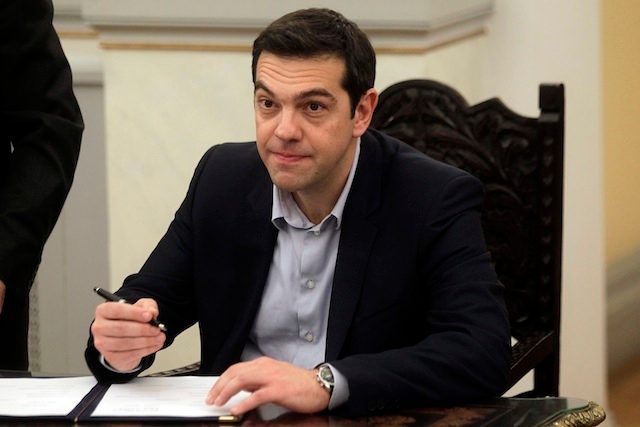SUMMARY
This is AI generated summarization, which may have errors. For context, always refer to the full article.

ATHENS, Greece – Greek Prime Minister Alexis Tsipras announced his resignation and called for snap elections on Thursday, August 21, as he went on the offensive to defend the country’s massive bailout after it triggered a rebellion within his own party.
The election is expected to be held on September 20, the Greek news agency ANA said, citing government sources.
“I will shortly meet with the president of the republic and present my resignation and that of my government,” Tsipras said in a live televised address to the nation.
“I want to submit to the Greek people everything I have done (since taking office in January) so that they can decide once more,” Tsipras said.
The move leaves Greece in the hands of a caretaker government until the vote.
Tsipras’s announcement came after debt-crippled Greece paid a huge debt to the ECB on Thursday, effectively starting its third mammoth bailout, expected to cost as much as 86 billion euros ($96 billion) over the next three years.
It is the latest gamble by the charismatic young premier, who successfully persuaded Greeks to reject tough reforms in a referendum last month, only to adopt them at a eurozone summit a week later.
The European Commission, one of the creditor institutions overseeing the new rescue package, earlier welcomed reports of a snap election in Greece, saying it would politically bolster the just launched bailout, the country’s third in five years.
“Swift elections in Greece can be a way to broaden support for ESM stability support programme just signed by Prime Minister Tsipras on behalf of Greece,” tweeted Martin Selmayr, chief of staff to commission head Jean-Claude Juncker, referring to the EU bailout fund.
The election would be the second in eight months in Greece.
The government on Thursday cleared 3.4 billion euros owed to the European Central Bank, the ECB confirmed, marking an urgently needed truce in a row that saw Greek banks shuttered, the economy battered and nearly saw Greece thrown out of the eurozone.
Tsipras took the decision to call snap polls after meeting with members of his cabinet and as speculation swirled that he was to step down in a bid to regain office with a stronger hand.
Tsipras suffered an unprecedented setback in parliament on Friday, with 43 of 149 MPs in the governing Syriza party choosing to either oppose or abstain from the latest wave of creditor-demanded austerity.
Greek stocks fell on Thursday in the face of the political uncertainty, down 3.5 percent. Frankfurt and Paris were down by 2.0 percent.
‘Problems in the coming years’
Greece won the final green light on Wednesday to start repaying its debts and reviving its crippled economy after eurozone finance ministers formally approved the loans-for-reforms package.
The bailout includes more pain in the form of tax hikes, as well as a pensions overhaul and privatisations the government had previously opposed. Many Greeks viewed it as a humiliating climbdown.
The all-clear to unblock a first payment of 23 billion euros came once the bailout was approved by European parliaments, including Germany’s Bundestag.
“This agreement provides perspective for the Greek economy and a basis for sustainable growth,” said Jeroen Dijsselbloem, the Dutch finance minister who chairs the so-called Eurogroup of eurozone finance ministers.
“We are certain to encounter problems in the coming years but I trust we will be able to tackle them,” he added.
The decision unlocked 13 billion euros for Athens and set aside another 10 billion euros to recapitalise the country’s cash-starved banks.
Merkel’s ‘cowardly performance’
Last week, the eurozone’s finance ministers approved in principle the bailout to keep Greece in the single currency bloc and pay its bills.
The German parliament voted by an overwhelming majority on Wednesday to back the bailout, with Chancellor Angela Merkel spared her own rebellion of deputies opposing the aid.
But Germany’s top-selling Bild newspaper ran an unforgiving headline denouncing “Merkel’s cowardly performance” after she remained silent during the parliamentary debate.
But it celebrated the 67 lawmakers in her coalition who voted against the bailout, dubbing them the “righteous ones”.
Tsipras, 41, rode to power in January on a wave of popular anger against the tax hikes, spending cuts and reforms demanded by creditors in exchange for the two previous bailouts costing 240 billion euros.
He has said that Greece’s creditors — the European Union, European Central Bank, International Monetary Fund and the European Stability Mechanism — have agreed to discuss public debt relief measures when a first assessment of reform compliance is completed in November.
Greece’s debt currently stands at a towering 312.8 billion euros, the finance ministry said Wednesday, a level the IMF said is unsustainable and requires immediate relief. – Rappler.com
Add a comment
How does this make you feel?
There are no comments yet. Add your comment to start the conversation.